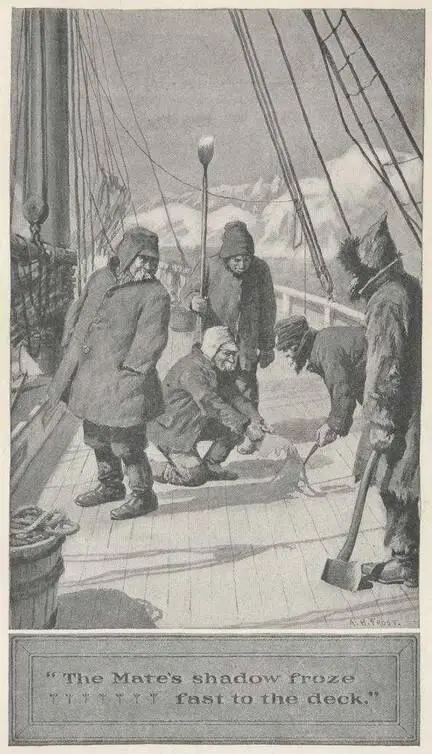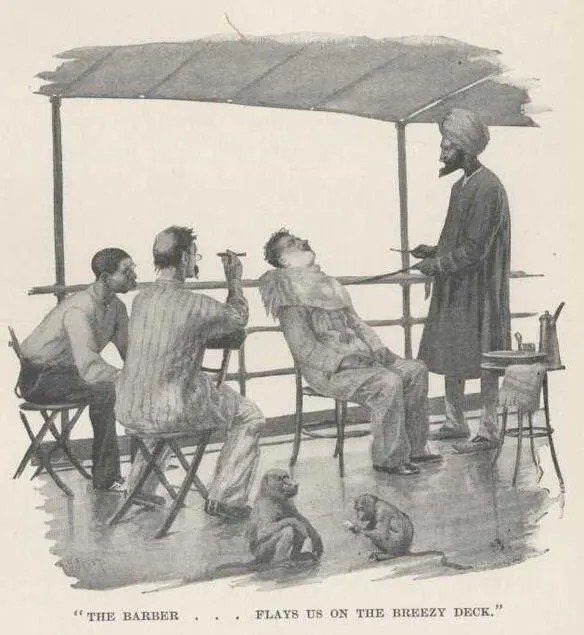Mark Twain - Following the Equator
Здесь есть возможность читать онлайн «Mark Twain - Following the Equator» весь текст электронной книги совершенно бесплатно (целиком полную версию без сокращений). В некоторых случаях можно слушать аудио, скачать через торрент в формате fb2 и присутствует краткое содержание. Год выпуска: 2004, Жанр: Классическая проза, Юмористическая проза, на английском языке. Описание произведения, (предисловие) а так же отзывы посетителей доступны на портале библиотеки ЛибКат.
- Название:Following the Equator
- Автор:
- Жанр:
- Год:2004
- ISBN:нет данных
- Рейтинг книги:3 / 5. Голосов: 1
-
Избранное:Добавить в избранное
- Отзывы:
-
Ваша оценка:
- 60
- 1
- 2
- 3
- 4
- 5
Following the Equator: краткое содержание, описание и аннотация
Предлагаем к чтению аннотацию, описание, краткое содержание или предисловие (зависит от того, что написал сам автор книги «Following the Equator»). Если вы не нашли необходимую информацию о книге — напишите в комментариях, мы постараемся отыскать её.
Following the Equator — читать онлайн бесплатно полную книгу (весь текст) целиком
Ниже представлен текст книги, разбитый по страницам. Система сохранения места последней прочитанной страницы, позволяет с удобством читать онлайн бесплатно книгу «Following the Equator», без необходимости каждый раз заново искать на чём Вы остановились. Поставьте закладку, и сможете в любой момент перейти на страницу, на которой закончили чтение.
Интервал:
Закладка:
Afternoon. The captain has been telling how, in one of his Arctic voyages, it was so cold that the mate's shadow froze fast to the deck and had to be ripped loose by main strength. And even then he got only about two-thirds of it back. Nobody said anything, and the captain went away. I think he is becoming disheartened . . . .

Also, to be fair, there is another word of praise due to this ship's library: it contains no copy of the Vicar of Wakefield, that strange menagerie of complacent hypocrites and idiots, of theatrical cheap-john heroes and heroines, who are always showing off, of bad people who are not interesting, and good people who are fatiguing. A singular book. Not a sincere line in it, and not a character that invites respect; a book which is one long waste-pipe discharge of goody-goody puerilities and dreary moralities; a book which is full of pathos which revolts, and humor which grieves the heart. There are few things in literature that are more piteous, more pathetic, than the celebrated "humorous" incident of Moses and the spectacles. Jane Austen's books, too, are absent from this library. Just that one omission alone would make a fairly good library out of a library that hadn't a book in it.
Customs in tropic seas. At 5 in the morning they pipe to wash down the decks, and at once the ladies who are sleeping there turn out and they and their beds go below. Then one after another the men come up from the bath in their pyjamas, and walk the decks an hour or two with bare legs and bare feet. Coffee and fruit served. The ship cat and her kitten now appear and get about their toilets; next the barber comes and flays us on the breezy deck.

Breakfast at 9.30, and the day begins. I do not know how a day could be more reposeful: no motion; a level blue sea; nothing in sight from horizon to horizon; the speed of the ship furnishes a cooling breeze; there is no mail to read and answer; no newspapers to excite you; no telegrams to fret you or fright you—the world is far, far away; it has ceased to exist for you—seemed a fading dream, along in the first days; has dissolved to an unreality now; it is gone from your mind with all its businesses and ambitions, its prosperities and disasters, its exultations and despairs, its joys and griefs and cares and worries. They are no concern of yours any more; they have gone out of your life; they are a storm which has passed and left a deep calm behind. The people group themselves about the decks in their snowy white linen, and read, smoke, sew, play cards, talk, nap, and so on. In other ships the passengers are always ciphering about when they are going to arrive; out in these seas it is rare, very rare, to hear that subject broached. In other ships there is always an eager rush to the bulletin board at noon to find out what the "run" has been; in these seas the bulletin seems to attract no interest; I have seen no one visit it; in thirteen days I have visited it only once. Then I happened to notice the figures of the day's run. On that day there happened to be talk, at dinner, about the speed of modern ships. I was the only passenger present who knew this ship's gait. Necessarily, the Atlantic custom of betting on the ship's run is not a custom here—nobody ever mentions it.
I myself am wholly indifferent as to when we are going to "get in"; if any one else feels interested in the matter he has not indicated it in my hearing. If I had my way we should never get in at all. This sort of sea life is charged with an indestructible charm. There is no weariness, no fatigue, no worry, no responsibility, no work, no depression of spirits. There is nothing like this serenity, this comfort, this peace, this deep contentment, to be found anywhere on land. If I had my way I would sail on for ever and never go to live on the solid ground again.
One of Kipling's ballads has delivered the aspect and sentiment of this bewitching sea correctly:
"The Injian Ocean sets an' smiles
So sof', so bright, so bloomin' blue;
There aren't a wave for miles an' miles
Excep' the jiggle from the screw."
April 14. It turns out that the astronomical apprentice worked off a section of the Milky Way on me for the Magellan Clouds. A man of more experience in the business showed one of them to me last night. It was small and faint and delicate, and looked like the ghost of a bunch of white smoke left floating in the sky by an exploded bombshell.
Wednesday, April 15. Mauritius. Arrived and anchored off Port Louis 2 A. M. Rugged clusters of crags and peaks, green to their summits; from their bases to the sea a green plain with just tilt enough to it to make the water drain off. I believe it is in 56 E. and 22 S.—a hot tropical country. The green plain has an inviting look; has scattering dwellings nestling among the greenery. Scene of the sentimental adventure of Paul and Virginia.
Island under French control—which means a community which depends upon quarantines, not sanitation, for its health.
Thursday, April 16. Went ashore in the forenoon at Port Louis, a little town, but with the largest variety of nationalities and complexions we have encountered yet. French, English, Chinese, Arabs, Africans with wool, blacks with straight hair, East Indians, half-whites, quadroons—and great varieties in costumes and colors.
Took the train for Curepipe at 1.30—two hours' run, gradually uphill. What a contrast, this frantic luxuriance of vegetation, with the arid plains of India; these architecturally picturesque crags and knobs and miniature mountains, with the monotony of the Indian dead-levels.
A native pointed out a handsome swarthy man of grave and dignified bearing, and said in an awed tone, "That is so-and-so; has held office of one sort or another under this government for 37 years—he is known all over this whole island and in the other countries of the world perhaps—who knows? One thing is certain; you can speak his name anywhere in this whole island, and you will find not one grown person that has not heard it. It is a wonderful thing to be so celebrated; yet look at him; it makes no change in him; he does not even seem to know it."
Curepipe (means Pincushion or Pegtown, probably). Sixteen miles (two hours) by rail from Port Louis. At each end of every roof and on the apex of every dormer window a wooden peg two feet high stands up; in some cases its top is blunt, in others the peg is sharp and looks like a toothpick. The passion for this humble ornament is universal.
Apparently, there has been only one prominent event in the history of Mauritius, and that one didn't happen. I refer to the romantic sojourn of Paul and Virginia here. It was that story that made Mauritius known to the world, made the name familiar to everybody, the geographical position of it to nobody.
A clergyman was asked to guess what was in a box on a table. It was a vellum fan painted with the shipwreck, and was "one of Virginia's wedding gifts."
April 18. This is the only country in the world where the stranger is not asked "How do you like this place?" This is indeed a large distinction. Here the citizen does the talking about the country himself; the stranger is not asked to help. You get all sorts of information. From one citizen you gather the idea that Mauritius was made first, and then heaven; and that heaven was copied after Mauritius. Another one tells you that this is an exaggeration; that the two chief villages, Port Louis and Curepipe, fall short of heavenly perfection; that nobody lives in Port Louis except upon compulsion, and that Curepipe is the wettest and rainiest place in the world.
Читать дальшеИнтервал:
Закладка:
Похожие книги на «Following the Equator»
Представляем Вашему вниманию похожие книги на «Following the Equator» списком для выбора. Мы отобрали схожую по названию и смыслу литературу в надежде предоставить читателям больше вариантов отыскать новые, интересные, ещё непрочитанные произведения.
Обсуждение, отзывы о книге «Following the Equator» и просто собственные мнения читателей. Оставьте ваши комментарии, напишите, что Вы думаете о произведении, его смысле или главных героях. Укажите что конкретно понравилось, а что нет, и почему Вы так считаете.











